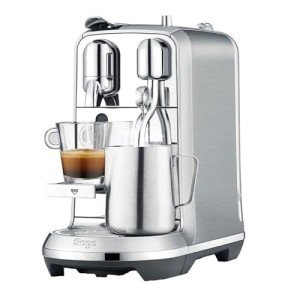Home Use Espresso Machines: A Comprehensive Guide
Espresso machines have actually ended up being a staple in lots of homes as coffee lovers seek to duplicate café-quality brews in the comfort of their kitchen areas. The rise in popularity has actually led to a varied market filled with numerous models, functions, and rates. This article intends to offer a useful overview of home use espresso machines, assisting readers navigate their alternatives effectively.
Comprehending Espresso Machines
Espresso machines work by requiring warm water through finely-ground coffee under high pressure, resulting in a concentrated coffee drink known as espresso. There are numerous kinds of espresso machines categorized based on their developing methods and level of automation. The most common types consist of:
- Manual Espresso Machines: These need the user to control the pressure and water circulation, permitting a more hands-on coffee-making experience.
- Semi-Automatic Espresso Machines: These offer automatic control over water pressure, while the user manually grinds and tamps the coffee.
- Automatic Espresso Machines: With the push of a button, these machines automatically manage the flow of water, making it much easier to brew espresso with consistent results.
- Super-Automatic Espresso Machines: These all-in-one machines handle grinding, tampering, developing, and even milk frothing, making them perfect for users searching for convenience.
- Capsule or Pod Machines: These use pre-packaged coffee pods to create espresso with very little effort, but they limit option in brewing methods and flavors.
Table: Comparison of Espresso Machine Types
| Type | Control Level | Alleviate of Use | Cleaning up Level | Suitable For |
|---|---|---|---|---|
| Manual | User-controlled | Moderate | High | Coffee purists |
| Semi-Automatic | Partial automation | Moderate | Moderate | Home baristas |
| Automatic | Totally automated | Easy | Low | Busy individuals |
| Super-Automatic | Totally automated | Really simple | Very low | Convenience hunters |
| Capsule/Pod | Totally automated | Really easy | Really low | Casual drinkers |
Secret Features to Consider
When selecting a home use espresso machine, it's vital to consider various functions that can substantially affect the quality of espresso and user experience.
- Pressure: Look for machines that provide at least 9 bars of pressure, as this is considered ideal for developing espresso.
- Boiler Systems: Single vs. dual boiler systems figure out temperature level stability and the ability to brew espresso and steam milk at the same time.
- Grinder: Integrated grinders enable for freshly ground coffee, which boosts taste. Consider machines with adjustable grind settings.
- Milk Frother: For those who delight in cappuccinos and lattes, an integrated steam wand or automatic frother is essential.
- Size and Design: Consider your kitchen area area and visual preferences. Machines are available in different sizes, from compact to large setups.
- Rate: Home espresso machines can vary from a couple of hundred to a number of thousand dollars, so it's crucial to develop a budget before checking out choices.
Pros and Cons of Home Use Espresso Machines
| Pros | Cons |
|---|---|
| Convenience of brewing coffee at home | Initial investment can be high |
| Quality of espresso is typically remarkable | Requires some skill, particularly with manual machines |
| Ability to experiment with flavors | Upkeep and cleansing can be labor-intensive |
| Can conserve cash in the long run | Not all machines will match every coffee choice |
Upkeep and Cleaning Tips
Keeping an espresso machine is vital for extending its life and making sure constant brew quality. Here are some helpful tips:
- Regular Descaling: Minerals from water can develop in the machine. Espresso Machines Under £200 -3 months, depending upon water solidity.
- Daily Cleaning: Rinse portafilters, baskets, and steam wands after each use to avoid coffee oils from building residue.
- Use Filtered Water: This can help reduce mineral buildup and improve the taste of coffee.
- Replace Gaskets and Seals: These components may wear gradually and should be changed to maintain pressure and performance.
- Check out the Manual: Each machine has particular care directions; following these will ensure longevity.
FAQs About Home Use Espresso Machines
Q1: What is the very best budget espresso machine?The best budget espresso machine frequently depends on specific needs, however models like the DeLonghi EC155 or the Breville Bambino are popular among users for supplying fantastic value. Q2: How long do home espresso machines generally last?With proper upkeep, home espresso machines can last anywhere from 5 to 15 years, depending upon the quality of the machine and frequency of use. Q3: Can I make cappuccinos and lattes with any espresso machine?While most espresso machines can make cappuccinos and lattes, having a reliable
steam wand or frother is important for accomplishing the ideal milk texture.
Q4: Are super-automatic machines worth the investment?For those who focus on convenience and quick brewing, super-automatic machines can be worth the financial investment, though they may lack some customizability in brew strength and flavor. Q5: What types of coffee beans are best for espresso?While personal choice contributes, beans labeled as" espresso "blends are usually roasted darker, creating abundant tastes and a creamy texture when brewed.
Purchasing a home espresso machine can transform the day-to-day coffee regimen into something unique, raising home brews to café quality. By comprehending the different types of machines, essential functions to consider, upkeep needs, and weighing the
advantages and disadvantages, consumers can make informed choices that fit their individual choices. As the espresso culture continues to grow, no matter the option, every brew can be a scrumptious experience waiting to be relished.

